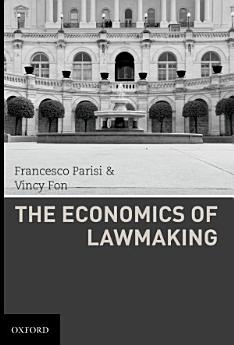The Economics of Lawmaking
Dec 2008 · Oxford University Press
Ebook
352
Pages
family_home
Eligible
info
reportRatings and reviews aren’t verified Learn More
shoppingmode30% price drop on Jul 29
About this ebook
The Economics of Lawmaking explores the relative advantages and limits of alternative sources of law. Professors Francesco Parisi and Vincy Fon view the sources of law through a law and economics lens, and consider the important issue of institutional design in lawmaking. They consider the respective advantages and proper scope of application of four fundamental sources of law: legislation, judge-made law, customary law, and international law. The defining features of these four sources of law are examined using the formal methods of public choice theory: lawmaking through legislation; lawmaking through adjudication; lawmaking through practice; and lawmaking through agreement. This book begins by examining the sources of law dependent on collective political decision-making, such as legislation. Multiple issues are considered, such as optimal specificity of law, optimal timing of legal intervention and optimal territorial scope of law, and include a thorough discussion on the sources of law derived from judges' decisions, such as common law. Parisi and Fon provide an extensive study on the roles of litigation and judicial path-dependence on judge-made law, biases in the evolution of legal remedies through litigation, and the effect of alternative doctrines of legal precedent, such as stare decisis and jurisprudence constante. They also consider the customary sources of law, with special attention on the mechanisms that determine their emergence and evolution, and explore sources of law derived from international treaties and conventions. The Economics of Lawmaking is the first systematic law and economics treatment of this field and will shed new light on the process of lawmaking.
About the author
Francesco Parisi is a Professor of Law at the University of Minnesota Law School and a Professor of Economics at the University of Bologna, Department of Economics. In 2002, he was appointed Professore Ordinario per Chiara Fama at the University of Milan (Statale) where he held a Chair in Private Law. From 1993 to 2006, he taught at George Mason University where he served as Professor of Law & Director of the Law and Economics Program and as an Associate Director of the J.M. Buchanan Center for Political Economy. Professor Parisi received his D.Jur. degree from the University of Rome "La Sapienza", an LL.M., a J.S.D. and an M.A. degree in Economics from the University of California at Berkeley and a Ph.D in Economics from George Mason University. He is the author of ten books and over one-hundred and fifty papers in the field of law and economics. Professor Parisi currently serves as Editor-in-Chief of the Review of Law and Economics and the Supreme Court Economic Review. He is a member of the board of editors of the International Review of Law and Economics, the journal of Public Choice, and the American Journal of Comparative Law. Vincy Fon teaches Economics at the George Washington University and received her PhD in economics from the University of Kansas. Her research areas include law and economics and applied microeconomics. Among other courses, she teaches graduate microeconomics, undergraduate law and economics, and undergraduate game theory. She has served as a program director in the economics program at the National Science Foundation and as a consultant for the World Bank.
Rate this ebook
Tell us what you think.
Reading information
Smartphones and tablets
Install the Google Play Books app for Android and iPad/iPhone. It syncs automatically with your account and allows you to read online or offline wherever you are.
Laptops and computers
You can listen to audiobooks purchased on Google Play using your computer's web browser.
eReaders and other devices
To read on e-ink devices like Kobo eReaders, you'll need to download a file and transfer it to your device. Follow the detailed Help Center instructions to transfer the files to supported eReaders.





